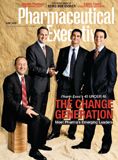The Buddy System
Pharmaceutical Executive
Jean-Marc Niemetz on forming partnerships with the industry's major stakeholders
To even a casual industry observer, it should come as no surprise to discover that in a recent Capgemini study, "Customer Value Integration: How to Re-Tune Pharma's Commercial Model in Light of Changing Stakeholder Influence," 45 percent of pharmaceutical executives surveyed said that they were responding to an increasingly tough market by engaging in "significant reduction of sales reps," and more use of technology. Also unsurprising is the fact that 41 percent indicated that their companies were increasing partnerships with payers. As the sales force shrinks and market challenges grow, pharma needs to build strong, trusting relationships with doctors, patients, payers, HMOs, and other influential groups. The study's authors recommend that pharma actively seek opportunities to collaborate with these increasingly powerful, nontraditional industry stakeholders.

Jean-Marc Neimetz
The survey also highlights a "perception gap" between how executives view the current market and how they act in response to it. In other words, knowing the end goal doesn't always translate to pursuing that goal.
For further insight on the study, Pharm Exec spoke to Jean-Marc Neimetz, vice president and life sciences industry team leader for Capgemini in North America. Neimetz hails from France, where he obtained his degree from the Paris Business School. Before joining Capgemini, he was a deputy representative at Credit Commercial De France in Mumbai, India.
Today, with over 17 years of international consulting experience, Neimetz frequently advises pharma and biotech companies on marketing and sales effectiveness, corporate strategy and organization, and other issues.
Who are the major stakeholders in the industry, and has pharma begun to reach out to them?
Today, there are many stakeholders who influence the pharma industry and prescribing behavior: physicians, managed care, patients, and government. Because of that complexity, pharmaceutical companies are struggling to create a proposition that is differentiated to address the needs of different stakeholders
Pharmaceutical companies don't really know the customer well, and it makes life more difficult for them. Their approach to getting to know the customer better is to capture more and more information during interactions with the customer. It's great to know more about your customer. But it can be very easy to become swept up in getting a lot of data and analysis. When you look at the ability of the pharma industry to respond quickly to this data and change its message swiftly ... well, it's not an industry that moves extremely fast. Therefore, the industry is going to struggle with this transformation.
In order to serve its customers' needs, pharma has to build tighter relationships with them. We've seen the beginning of partnerships between pharmaceutical companies and managed care organizations in the area of drug development. We're beginning to see pharma companies consulting with payers ahead of time to make sure that if they were to bring a particular product to the table, the pharma would be reimbursed at a reasonable level.
And pharmaceutical companies are absolutely starting to partner with patients and focus groups, especially in specific disease areas. In Europe, we ran a patient access initiative where we brought representatives from the industry, regulatory authority groups from Europe, and also patient advocacy groups to the same table to discuss how to better meet the needs of these different communities.
That initiative was really groundbreaking. I think it was the first time we had such a structured and open discussion with those different stakeholders all trying to see and understand each other's perspective, and trying to see what should be done in order to make the system better.
For pharma companies, the questions are: How do we find ways to fund basic research in areas that are very difficult to break into? How do we work better with regulatory authorities to get our product to the market? For patients, the main question is: How do we make sure that our needs are known and taken into account during development? In response to these questions, we designed a few initiatives that are now under discussion with those same groups.
Do you think pharma companies actually want to create partnerships with patients, or do they just pay lip service to the idea?
Companies know very well how physicians and patients will react to a product, but this doesn't mean they really know the holistic needs of their customers. Pharma companies want to better understand the needs of patients, and serve them as much as they can, along with physicians as their partners. If you get people who drop off treatment, it's a loss of revenue for the industry. And we know that sometimes people do just drop off their treatment. They won't fill the prescription. So from a purely business perspective, it makes sense to get closer to patients in the area of compliance.
How does the movement toward partnership with stakeholders influence the sales model?
The traditional model was sales force based. Depending on the product, the sales force effort might be combined with DTC in the US in order to create patient demand. Today, the industry is moving toward reducing the size of the sales force, and putting in place a multichannel information-based marketing approach.
Sales reps are looking at the physician as someone with whom they need to employ more listening and more understanding, rather than simply pushing a product on him.
Which patient advocacy group is the most vocal about claiming a stake in pharma?
That's a difficult question because there are many groups, and some are not as well organized as others. Some, like seniors, are huge in terms of sheer numbers, and very well organized. Some focus on rare diseases, and do not necessarily have a voice at the table yet—but they're trying different ways to make themselves heard. I wouldn't say one group is more vocal than others; I think they are all trying to be part of the influence network in the system.
Patients have to have a voice. They will probably increase their presence, if not to make sure that their needs are taken into account, just to make sure that since they are paying more they can counterbalance the impact of managed care and the transfer of the cost of healthcare from the employer to their own wallet. And while many consumers are becoming aware and asking questions, it doesn't mean they're necessarily well informed or well prepared to deal with the most dramatic situations.
Jean-Marc Neimetz is vice president and life sciences industry team leader for Capgemini in North America. He is responsible for the development of Capgemini Life Sciences capabilities and strategic partnerships, as well as for management of key assignments in the area of strategy and transformation. He frequently designs and implements large transformation programs with major pharmaceutical and biotech companies. He has been a business consultant for over 17 years.
Executives on Market Changes
Capgemini asked over 100 pharmaceutical executives, "In a nutshell, what is your view of the nature of the changes we've started to see in how pharmaceutical products are brought to market?" The answers:
51% chose "structural" (responses to fundamental shifts in the market)
38% chose "incremental" (continuation of longer term trend)
11% chose "temporary" (short term reactions to current challenges)
SOURCE: Capgemini, 2008

Addressing Disparities in Psoriasis Trials: Takeda's Strategies for Inclusivity in Clinical Research
April 14th 2025LaShell Robinson, Head of Global Feasibility and Trial Equity at Takeda, speaks about the company's strategies to engage patients in underrepresented populations in its phase III psoriasis trials.
Beyond the Prescription: Pharma's Role in Digital Health Conversations
April 1st 2025Join us for an insightful conversation with Jennifer Harakal, Head of Regulatory Affairs at Canopy Life Sciences, as we unpack the evolving intersection of social media and healthcare decisions. Discover how pharmaceutical companies can navigate regulatory challenges while meaningfully engaging with consumers in digital spaces. Jennifer shares expert strategies for responsible marketing, working with influencers, and creating educational content that bridges the gap between patients and healthcare providers. A must-listen for pharma marketers looking to build trust and compliance in today's social media landscape.
FDA Approves Nipocalimab for the Treatment of Generalized Myasthenia Gravis
April 30th 2025Approval is based on results from the pivotal Vivacity-MG3 trial in which IMAAVY (nipocalimab-aahu) demonstrated superior disease control throughout 24 weeks when compared to placebo plus standard of care.